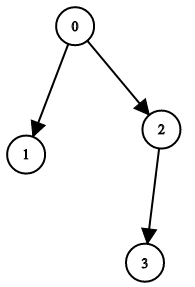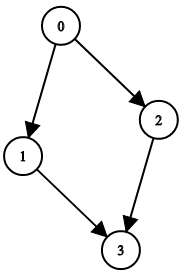Validate Binary Tree Nodes
Problem Statement
You have n binary tree nodes numbered from 0 to n - 1 where node i has two children leftChild[i] and rightChild[i], return true if and only if all the given nodes form exactly one valid binary tree.
If node i has no left child then leftChild[i] will equal -1, similarly for the right child.
Note that the nodes have no values and that we only use the node numbers in this problem.
Example 1:

Input: n = 4, leftChild = [1,-1,3,-1], rightChild = [2,-1,-1,-1]
Output: true
Example 2:

Input: n = 4, leftChild = [1,-1,3,-1], rightChild = [2,3,-1,-1]
Output: false
Example 3:

Input: n = 2, leftChild = [1,0], rightChild = [-1,-1]
Output: false
Constraints:
n == leftChild.length == rightChild.length1 <= n <= 104-1 <= leftChild[i], rightChild[i] <= n - 1
Code
Python Code
from collections import deque
class Solution:
def validateBinaryNodes(self, n, leftChild, rightChild):
# find the root node, assume root is node(0) by default
# a node without any parent would be a root node
# note: if there are multiple root nodes => 2+ trees
root = 0
childrenNodes = set(leftChild + rightChild)
for i in range(n):
if i not in childrenNodes:
root = i
# keep track of visited nodes
visited = set()
# queue to keep track of in which order do we need to process nodes
queue = deque([root])
while queue:
node = queue.popleft()
if node in visited:
return False
# mark visited
visited.add(node)
# process node
if leftChild[node] != -1:
queue.append(leftChild[node])
if rightChild[node] != -1:
queue.append(rightChild[node])
# number of visited nodes == given number of nodes
# if n != len(visited) => some nodes are unreachable/multiple different trees
return len(visited) == n